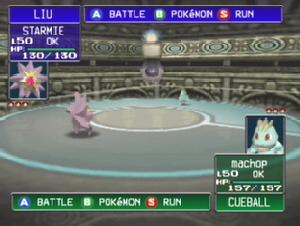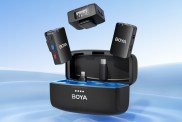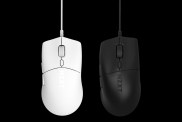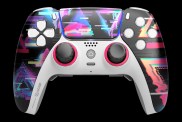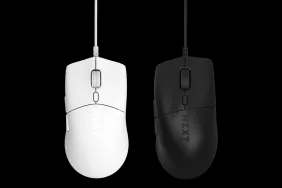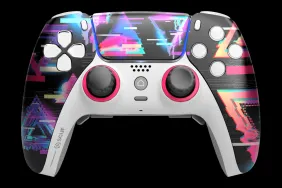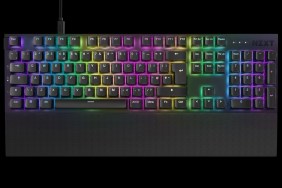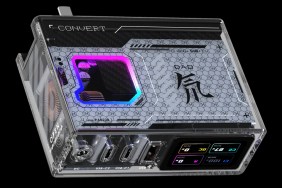Okay – I admit to having watched more than a few episodes of the Pokemon cartoon,
but what strikes me about the series (and feel free to agree with me) is that
most episodes are centered on making fun of the dumb Pokemon. And I’m all for
that! Forget the fact that the show is just a commercial or how whiny that Ash
kid is… Pokemon is all about making fun of the weak.
Speaking of weak, Poke-ndo (the company formerly known as Nintendo) has brought
forth another entry to the Poke-palooza. Pokemon Stadium is an N64 rehaul
of the original Pokemon, offering better graphics and straight up matches. Instead
of static images, you can watch the Pokemon duke it out in rendered detail.
Included are a whole gauntlet of challenges, Gym Leader Battles, multiplayer
options, and several Mario Party-esque
mini games.
The selling point of Stadium (here on out, I’m referring to the game
as Stadium; one can only say Pokemon so many times before their head
starts to hurt) is that it’s an extension of the Game Boy game. By using the
nifty transfer pack included with each copy, you can take your Gameboy Pokemon
and bring them to your N64. There’s even a way to reorganize the Pokemon in
your Game Boy. Those of you without the Game Boy game will have to settle for
the “rental” pokemon included with Stadium. Functional, but it’s just
not the same as using the Pokemon you’ve raised.
According to that wacky and mean Pokemon cartoon, Pokemon speak by saying their
names. Despite their limited vocabulary, this speech impediment serves to give
the Pokemon personality. Shamefully, I find this funny. Funnier still is why
these trademark voices were left out of Stadium. Instead of hearing Jigglypuff
sing its little song or PoogleyDoogleyPuss (note: fictitious Pokemon. Cannot
be caught…or can it?) shout its wicked battle-cry, you get the same beeps
and noises found in the Game Boy game. How hard would it have been to stick
those voices in?
And you know what else they should have put in? Subtitles. Loads of subtitles, including such quaint phrases as “Who’s your daddy?” and “Say my name!”
But instead, you get an irritating announcer. Really irritating. For example, you take a step away from the game to, say, write a game review. The announcer starts shouting, “Hurry up trainer!” “What’s the matter, trainer?” I’ll tell you what’s the matter… there’s no pause button! And I’m stuck listening to the lousy announcer and re-mixed Pokemon music over and over. Urrarrgh! Thankfully, you can turn that damn announcer off.
Despite the lack of voices, the Pokemon still exhibit personality in spades through the character graphics and animations. These aren’t the most jaw-dropping graphics out there, but they perfectly capture the look of the individual Pokemon.
Better still are the animations. The Pokemon bounce around, leer at one other and dance in cartoon quality animation. They even have cute death animations! Unfortunately, in contrast, the backgrounds are empty and boring.
The focus of Pokemon’s one player Game Boy game has always leaned more on the side of exploration and catching Pokemon. Once you’ve developed a high level Pokemon like Mewtwo, there’s a tendency to just use that to blow away your opponents. On the Gameboy, the game becomes a rote level building exercise.
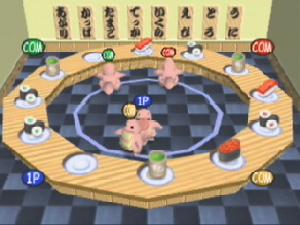 But
But
in Stadium‘s many challenges, your Pokemon don’t have that level advantage;
your digital opponent’s Pokemon will always have higher levels. Matches become
less about statistical advantages and more about understanding the skills and
weaknesses of the different Pokemon. By re-centering the game on its original
elemental “paper-rock-scissors” system of checks and balances, the game becomes
focused on strategy and gains a lot of depth.
For instance, you have to fight a Raichu. Rock-type Pokemon are strong against
electrical Pokemon. But this Raichu has been equipped with a surf attack, allowing
him to easily kill off rock Pokemon. Figuring out how to approach the problem
with the right selection of Pokemon and the right moves during the game is the
crux of Stadium‘s strategy.
But after awhile, despite the many challenges, it just feels like more of the
same. Am I replaying this Gym Leader over and over because it’s fun, or just
because I want the all-hallowed status of Pokemon Master?
A partial attempt at adding something different is the 9 button mashing mini games. Despite their simplicity and similarity, these games are fun. Where else can you find a game devoted to sushi? You control a Lickitung using its big ass tongue to grab at the sushi floating by. The Lickitung cry like little schoolgirls when they accidentally consume wasabi. And all the while, the computer yells out unintelligible Japanese phrases. Good, weird stuff.
Stadium should be thought of as an add-on to the Game Boy games. If you don’t have the Game Boy version, you are missing out. Stadium complements the Game Boy versions, offering you a different angle of the Pokemon gameplay. The problem is that it becomes repetitious.
After you’ve seen all the pretty animations and fought through your fair share
of challenges, there’s nothing more to it – unless you play Pokemon religiously.
Only then will you keep playing the multiplayer battles, go back through the
challenges, and find yourself logging hours at the mini games. It goes without
saying that if you hate Pokemon, stay far, far, far away from this one. Poke-fanatics,
on the other hand, will look past the many weaknesses and love this game.
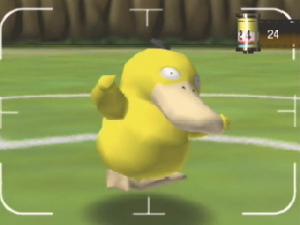
-
Character graphics and animations
-
Re-centered focus on strategy
-
Many challenges and options
-
Lousy audio
-
Too much of the same
-
Really just an add-on
